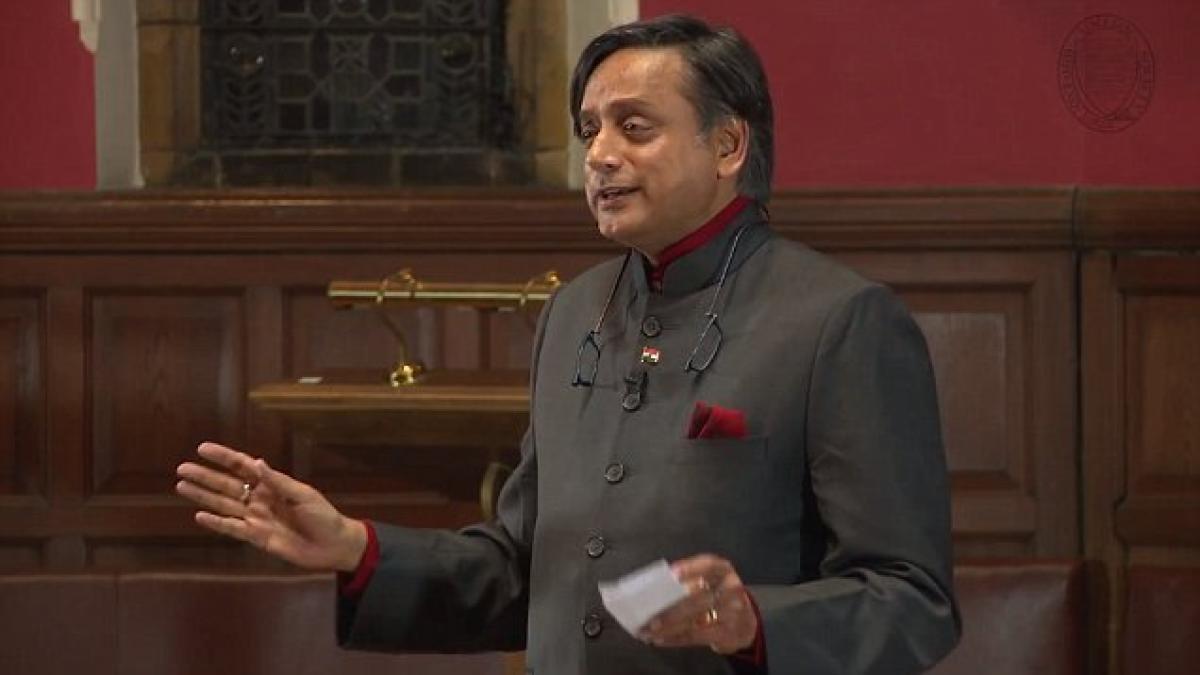Live
- GMR Airports Unveils AI-Powered Digital Twin Platform to Transform Airport Operations
- India poised to become leading maritime player: PM Modi
- Top Causes of Kidney Stones and How to Recognize Silent Symptoms
- India’s renewable energy capacity logs 14.2 pc growth at 213.7 GW
- Winter Session of Odisha Assembly adjourned sine die
- Biden calls Trump's tariff approach 'major mistake'
- After Drama Over Eknath Shinde’s Chief Minister Race, Maharashtra Cabinet Formation Faces New Tensions
- Egyptian FM, Blinken discuss recent developments in Syria
- Iran's supreme leader says Syria's developments result of US-Israeli 'plot'
- Elon Musk to Purchase $100 Million Luxury Mansion Next to Donald Trump's Mar-a-Lago, Report Reveals
Just In

A viable reparation formula for colonial exploitation by British is difficult but a British Prime Minister bending on knees asking forgiveness on the centenary of Jallianwala Bagh massacre will wash away in many ways the sense that there are wrongs that have not been acknowledged, feels Congress leader Shashi Tharoor.
New Delhi: A viable reparation formula for colonial exploitation by British is difficult but a British Prime Minister "bending on knees" asking forgiveness on the centenary of Jallianwala Bagh massacre will wash away in many ways the sense that there are wrongs that have not been acknowledged, feels Congress leader Shashi Tharoor.
The issue of reparation came into limelight after Tharoor spoke at Oxford on the proposition 'Britain Owes Reparations to Her Former Colonies' last year and his speech went viral on social media and was hailed by fans and critics alike.
Prime Minister Narendra Modi also had congratulated him for having said "the right things at the right place".
And now he has come out with a book 'An Era of Darkness: The British Empire In India' which discusses, in depth, the variety of ways in which the British nearly destroyed India during the heyday of the Empire.
"You cannot quantify the wrongs done. What is far more important than financial reparation would be an apology.
"People who are not responsible today for the wrongs done by their forebearers in the past era apologise nonetheless to people who are not the ones to whom wrong was done. But it is in a sense an entire society apologising to entire people," Tharoor, MP from Thiruvananthapuram, told PTI in an interview.
According to him, a viable reparation formula is difficult as a just sum would not be payable and a payable sum would not be just.
Citing two examples of Willy Brandt, the German social democrat leader who was in no way related to the crimes of the Nazis, going on his knees at Warsaw ghetto and apologising, and more recently Canadian Prime Minister Justin Trudeau apologising for the Komagata Maru incident though Canada did not actually kill anybody, he says these offer a model in the Indian context too.
"These two apologies offer a model for a future British Prime Minister on the centenary of the Jallianwala Bagh massacre to come to that site, bend his or her knees and beg forgiveness for all sins committed in the past.
"That I think will wash away in many ways the sense that there are wrongs that have not been acknowledged," the former Minister of State for External Affairs said.
In the book, he also writes, "David Cameron's rather mealy-mouthed description of the massacre in 2013 as a 'deeply shameful event' does not, in my view, constitute an apology.
"Nor does the ceremonial visit to the site in 1997 by Queen Elizabeth and the Duke of Edinburgh, who merely left their signatures in the visitors' book, without even a redeeming comment.
"Whoever the PM is on the centenary of that awful crime will not have been alive when the atrocity was committed, and certainly no British government of 2019 bears a shred of responsibility for that tragedy, but as a symbol of the nation that once allowed it to happen, the PM could atone for the past sins of his or her nation," Tharoor said.
The Jallianwala Bagh massacre had taken place in Amritsar on April 13, 1919. On hearing that a meeting of nearly 20,000 people was taking place at Jallianwala Bagh, Brigadier General R E H Dyer had ordered 50 riflemen to shoot at the crowd. More than 1000 innocent Indians were killed and over 1,100 injured.
Tharoor, however, feels reparation is a bit of red herring.
"I got into that debate because that happened to be the topic of the debate at Oxford that I was invited to.
"It is not necessarily the principal theme that I would have chosen for the debate and is certainly not the principal theme of my book because it actually concludes in the brief discussion on reparation issue that almost any amount that would do justice to crimes and losses suffered would be unpayable."
He said his speech at Oxford was inspired by decades of reading and passion about engagements with history and based on what he thought he knew.
On three most unpardonable things of the British, he names economic exploitation and ruination of India on the basis of which the colonial rulers built up their own property; cruelties and exaltation and glorification of those who perpetrated these; and racism and discrimination.
He said his book, published by Aleph, is written as an argument and it is not a narrative history or a dry scholarly work.

© 2024 Hyderabad Media House Limited/The Hans India. All rights reserved. Powered by hocalwire.com







